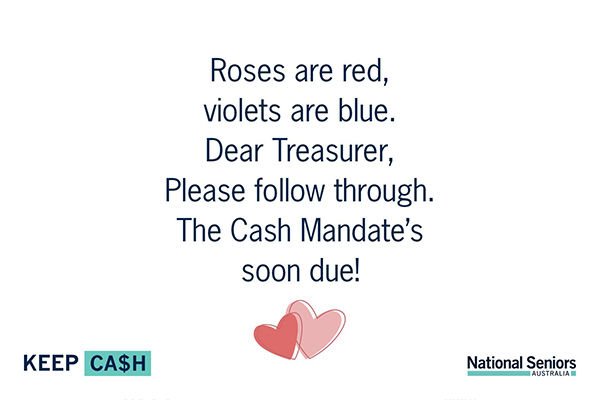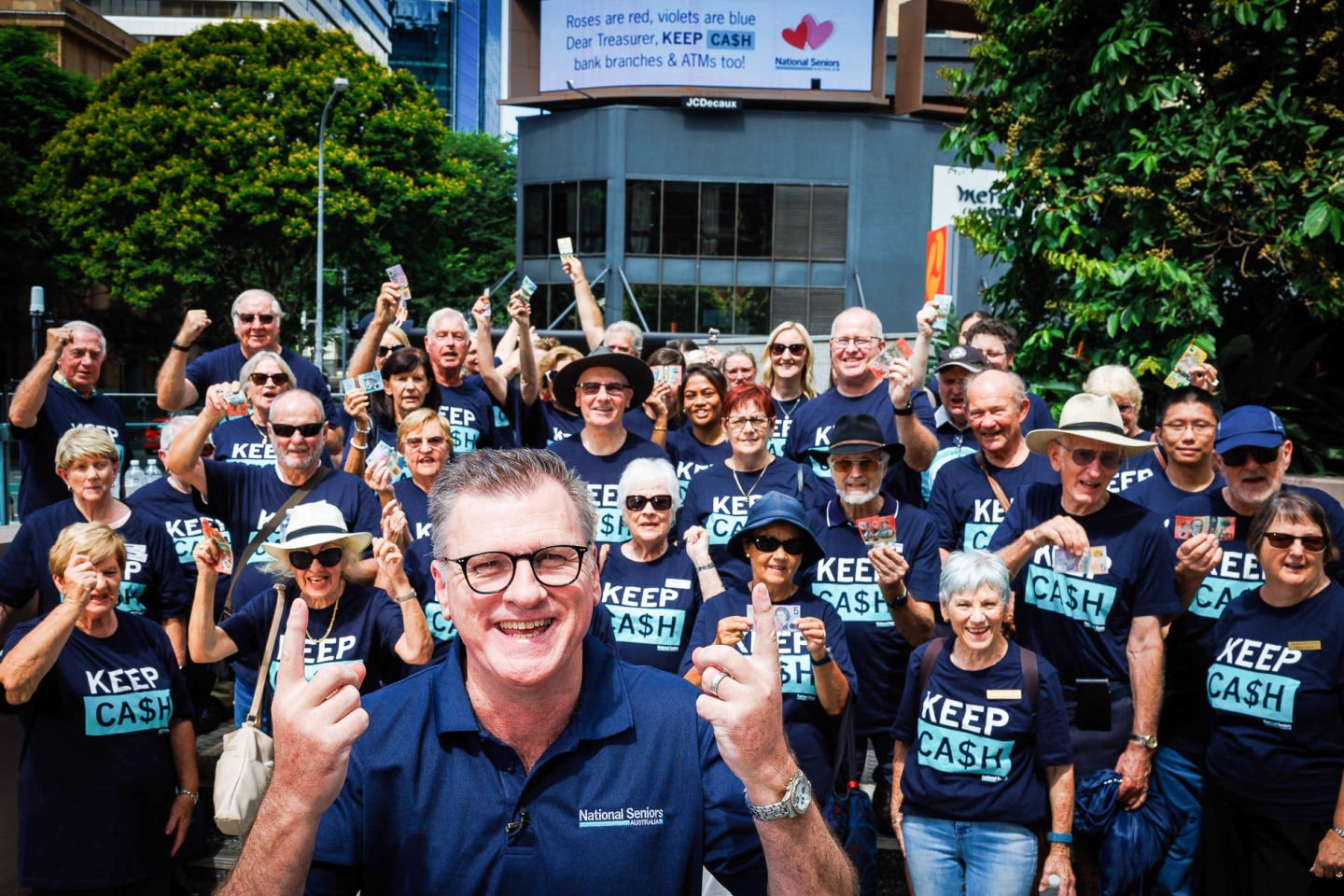Cash Mandate: Promise or government squib?
Is the government’s promise to mandate cash acceptance coming any time soon, or going the way of the dodo?


NSA’s campaign
On St Valentine’s Day in February this year, we took over a billboard to publish a poem that read, "Roses are red, violets are blue. Dear Treasurer, KEEP CASH, bank branches & ATMs too!”
We’ve now updated that poem to say, “Roses are red, violets are blue. Dear Treasurer, please follow through. The Cash Mandate’s soon due!”
Late last year, National Seniors Australia (NSA) welcomed the Federal Government’s promise to legislate that cash continue to be available to Australians.
Treasurer, Jim Chalmers, spruiked, “Final details of the mandate will be announced in 2025. Subject to the outcomes of consultation, the mandate would commence from 1 January 2026.”
That was good news, but what’s happened since?
Our choice to pay by cash
The government promise was, in part, a response to our KEEP CASH campaign, arising from concerns that the trend to digital transactions would lead to a cashless society, and deprive people of their choice to pay by cash.
The move to a fully digital economy concerns a great many people, especially older people who are not comfortable or able to use digital technology. The fear is some would be left vulnerable and their lives negatively affected, if they were denied access to and unable to use cash.
"It’s great to see the government has listened to the needs of seniors and shows the effectiveness of people power!” NSA CEO, Chris Grice, said at the time.
“As the Treasurer, Jim Chalmers, said, ‘there is an ongoing place for cash’. Similarly, NSA has always maintained digital payments should be in addition to, not instead of cash payments,” he said.
The government agreed. In February, Assistant Treasury Minister, Dr Andrew Leigh, told Parliament:
“… cash is also an important backup in instances of natural disasters. It is a form of financial system resilience. The government’s consultation paper quotes numbers from the Reserve Bank around the frequency of such outages. They have occurred hundreds or, in some categories of outage, thousands of times per year. While the system has a resiliency rate of over 99%, those outages, when they occur, can be extremely damaging. We’ve seen, in the instance of floods and fires, the online payment systems struggle to keep pace. It is therefore critical that cash is available.”
NSA cash mandate submission
Those arguments, and more, were made in our submission response to the Treasury’s consultation paper.
We said that not only is cash an important part of the payments system, but it is also particularly important to some sections of the population: seniors value cash and it is important to regional and remote communities.
However, our submission to government was critical of the proposed mandate. We said it included far too many exemptions and is overly complicated.
Among our chief concerns, NSA argued that:
Restricting the mandate for “essential” goods and services is problematic when the definition of essential goods excludes things that are clearly essential. For example, is it unreasonable that water, clothing for adults, furniture, whitegoods, and most government services are excluded as items attracting a cash acceptance mandate?
Using business turnover or legal structure as a basis for determining who must make payment by cash available is problematic and would not work in practice. For example, why should a consumer need to know the turnover or legal structure of a business to know if a business must or may not accept cash?
There is a lack of clarity about whether cash acceptance differs by product. For example, if someone buys a loaf of bread and a cake from a bakery, does the bakery have to accept cash for both, or only the bread which is included in the mandate?
You can read our submission here.
Why the delay?
Despite government assurances to keep the public updated, nothing more has been forthcoming despite the government setting out a clear timeline.
As part of the Treasury consultation, it was set out that:
Consultation on the proposed mandate would occur in Q4 of 2024
Proposed policy design for the mandate would be announced in Q1 of 2025
Exposure draft legislation would be released Q3 of 2025
Cash mandate legislation would be put to Parliament in Q4 of 2025
The mandate would commence from 1 January 2026.
The consultation period closed in February, and it is now well into September, however no further details about the cash mandate have been released.
NSA is particularly concerned that time is running out for the government to legislate the mandate by 1 January. Bringing legislation into Parliament and processing it through to law takes time, especially now as the government requires either Opposition or Greens support in the Senate.
Parliament sits infrequently between now and Christmas, so the pressure is on the government not to break a promise.
We accept the need for the government to get the mandate and processes around it right, but we find it difficult to understand why it hasn’t delivered on its promise to provide more information about the mandate, its progress, and how it will work.
Reason for delay?
What appeared to be an easy, vote-grabbing announcement to protect cash, may well have ballooned into something more complex and difficult.
As Assistant Minister Leigh told Parliament: “Labor's targeted approach balances the needs of the community with the impact on business. We want to avoid putting extra pressure on small businesses through big fines, particularly at a time when they’re doing it tough.
As NSA submitted, agreement on the definition of “essential services” is crucial. As is often the case in law-making, the devil is in the detail.
Another thing of interest, a cash mandate isn't unusual.
A range of US states have them in place, including Colorado, Massachusetts, and New York, as do a range of countries, including Austria, Denmark, Ireland, New Zealand, Norway, and Sweden.
So, let’s get the conversation and consultation back on track so we can get the mandate in place as soon as possible.
To support our work on cash acceptance, join our KEEP CASH campaign.
Related reading: NSA submission, NSA media release, Treasurer’s media release






